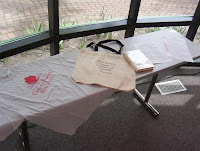This is a Wonderful Poem
Come at it carefully, don't trust it, that isn't its right name, It's wearing stolen rags, it's never been washed, its breath Would look moss-green if it were really breathing, It won't get out of the way, it stares at you Out of eyes burnt gray as the sidewalk, Its skin is overcast with colorless dirt, It has no distinguishing marks, no I.D. cards, It wants something of yours but hasn't decided Whether to ask for it or just take it, There are no policemen, no friendly neighbors, No peacekeeping busybodies to yell for, only this Thing standing between you and the place you were headed, You have about thirty seconds to get past it, around it, Or simply to back away and try to forget it, It won't take no for an answer: try hitting it first And you'll learn what's trembling in its torn pocket. Now, what do you want to do about it? From http://www.poets.org/viewmedia.php/prmMID/16205 accessed 5/31/08. I smiled when I read this poem for the first time. I'm trying to decide if David Wagoner has taken any risks in this poem. The tone of this poem is something like menace: “Come at it carefully, don't trust it...” “It won't get out of the way...” “It wants something of yours but hasn't decided/Whether to ask for it or just take it...” “It won't take no for an answer...” “What do you want to do about it?” This poem reminds me of a skit I saw in which a girl talks to a guy who isn't interested in talking to her. She wants to know what he likes to do for fun, she tells him she could have any guy in this place, she wants to know if he'll dance with her, she wants to know if he's gay, she asks him what's wrong with you, etc. The guy doesn't have much to say. He's not interested in her. She gets in his face much like this poem is getting in the face of the reader. So yes, Wagoner has taken the risk of appearing to be anti-social with this poem. In the fourth-to-last line, the “simply” doesn't need to be there. The “try to” doesn't need to be there either. The line could be “Or back away and forget it...” Wagoner may be making some subtle assertions here about his expectations of the reading ability of the average person and the way memory works. The poem wouldn't lose anything in my estimation if he took out “try hitting it first/And you'll learn what's trembling in its torn pocket.” Clearly he's having fun with this poem. The poem describes itself as something that is alive but does not anthropomorphize: the poem doesn't breathe. And there is another risk: the risk of the poem explaining itself. A good poem does not explain itself. This poem describes itself in a nebulous way and not in an explicit way, so it doesn't really explain itself. It does talk about what it's doing, as though it is self-aware. So there's a cleverness here because a poem is only capable of doing what the reader will allow it to do, and this poem describes itself as alive and waiting for the reader to decide what to do about it. Of course, the poem can at best only be metaphorically alive, and that could only happen with an indulging, generous, intelligent reader. And now we have an irony: the tone of voice in the poem is one that would attenuate any desire in the reader to be indulgent or generous toward the poem. But that is exactly what's needed for the poem to “live.” Here we have a “wonderful” poem that is clever and amusing and I would say memorable as well. Because I smiled when I read this poem, I know I will remember it. A smile is a visceral reaction, is it not? He got me.















































































